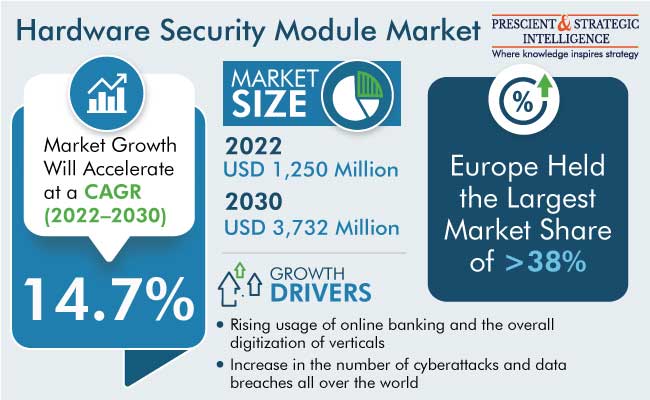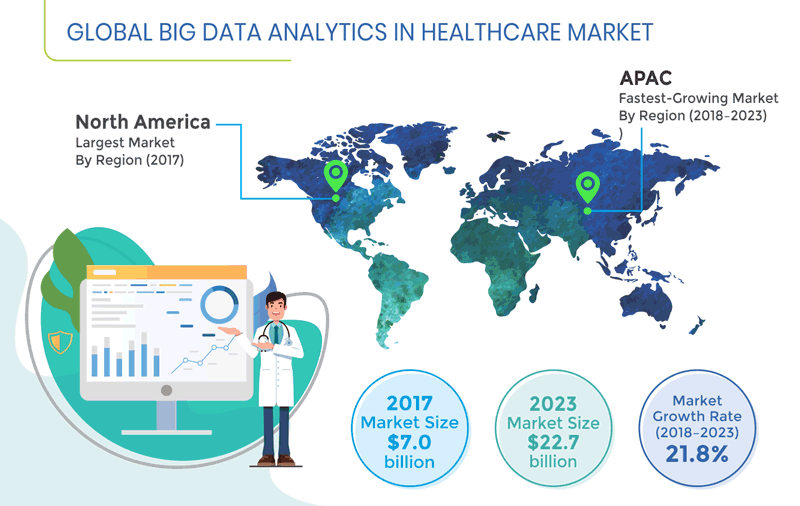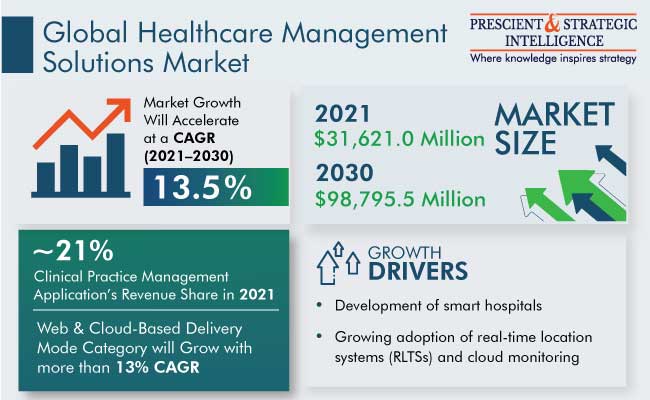Healthcare Management Solutions Market Will Reach USD 98,795.5 Million by 2030
The healthcare management solutions market will garner USD 98,795.5 million by 2030, advancing with a CAGR of 13.5% by the end of this decade.
The rising adoption of these solutions is brought on by the increasing demand for patient information management, appointment scheduling, hospital inventory, clinical error minimization, revenue cycle management, medical equipment handling, and various services that can help streamline the hospital workflow.
Due to ageing populations, rising medical treatment costs, and the frequency of chronic diseases, healthcare systems around the world are under increasing financial strain. Healthcare management programs provide economical means to coordinate patient care, allocate resources efficiently, and reduce administrative costs, all of which contribute to the delivery of healthcare that is more effective and long-lasting.
Strong data management and analytics solutions are required due to the massive accumulation of healthcare data. Healthcare management solutions use data analytics to gain insights, formulate better preventative care plans, increase clinical decision-making, and discover population health trends.
Healthcare organizations can modify their computing resources in response to changing needs due to cloud-based platform's scalable infrastructure. Despite making substantial upfront expenditures in equipment or IT infrastructure, cloud-based systems may meet the growing demand as the number of healthcare facility increases or patient numbers rise.
Users have the freedom to access the data at any time and from any location, which reduces operational costs.
The requirement for significant up-front capital investments is eliminated by the subscription-based pricing model used by web and cloud-based technologies. Pay as you go schemes are an option for doctors and hospitals and can be more economical, particularly for tiny clinics or healthcare organizations with not that much finances
To protect sensitive patient information, reputed cloud service providers use strong security controls, data encryption, and compliance certifications. Since data confidentiality, integrity, and availability are crucial for maintaining compliance with healthcare regulations, cloud solutions frequently comply with strict security standards.
North America held the largest share of the health care management solutions market in the past.
The increased frequency of chronic diseases, rising elderly population, increasing disposable income, and the rapid uptake of technologically sophisticated products in North America have all contributed to the region's supremacy.
Additionally, the region is adopting these solutions due to rising government spending on better healthcare facilities, an increase in surgical operations, a rise in hospitalization rates, and the quick digitalization of healthcare IT infrastructure.
It is because of the technical advancements, growing aging population, and government support for the digitalization of healthcare infrastructure, the demand for healthcare management solutions is growing, and this trend will continue in the years to come as well.
Read More:
https://www.psmarketresearch.com/market-analysis/healthcare-management-marketHealthcare Management Solutions Market Will Reach USD 98,795.5 Million by 2030
The healthcare management solutions market will garner USD 98,795.5 million by 2030, advancing with a CAGR of 13.5% by the end of this decade.
The rising adoption of these solutions is brought on by the increasing demand for patient information management, appointment scheduling, hospital inventory, clinical error minimization, revenue cycle management, medical equipment handling, and various services that can help streamline the hospital workflow.
Due to ageing populations, rising medical treatment costs, and the frequency of chronic diseases, healthcare systems around the world are under increasing financial strain. Healthcare management programs provide economical means to coordinate patient care, allocate resources efficiently, and reduce administrative costs, all of which contribute to the delivery of healthcare that is more effective and long-lasting.
Strong data management and analytics solutions are required due to the massive accumulation of healthcare data. Healthcare management solutions use data analytics to gain insights, formulate better preventative care plans, increase clinical decision-making, and discover population health trends.
Healthcare organizations can modify their computing resources in response to changing needs due to cloud-based platform's scalable infrastructure. Despite making substantial upfront expenditures in equipment or IT infrastructure, cloud-based systems may meet the growing demand as the number of healthcare facility increases or patient numbers rise.
Users have the freedom to access the data at any time and from any location, which reduces operational costs.
The requirement for significant up-front capital investments is eliminated by the subscription-based pricing model used by web and cloud-based technologies. Pay as you go schemes are an option for doctors and hospitals and can be more economical, particularly for tiny clinics or healthcare organizations with not that much finances
To protect sensitive patient information, reputed cloud service providers use strong security controls, data encryption, and compliance certifications. Since data confidentiality, integrity, and availability are crucial for maintaining compliance with healthcare regulations, cloud solutions frequently comply with strict security standards.
North America held the largest share of the health care management solutions market in the past.
The increased frequency of chronic diseases, rising elderly population, increasing disposable income, and the rapid uptake of technologically sophisticated products in North America have all contributed to the region's supremacy.
Additionally, the region is adopting these solutions due to rising government spending on better healthcare facilities, an increase in surgical operations, a rise in hospitalization rates, and the quick digitalization of healthcare IT infrastructure.
It is because of the technical advancements, growing aging population, and government support for the digitalization of healthcare infrastructure, the demand for healthcare management solutions is growing, and this trend will continue in the years to come as well.
Read More: https://www.psmarketresearch.com/market-analysis/healthcare-management-market




